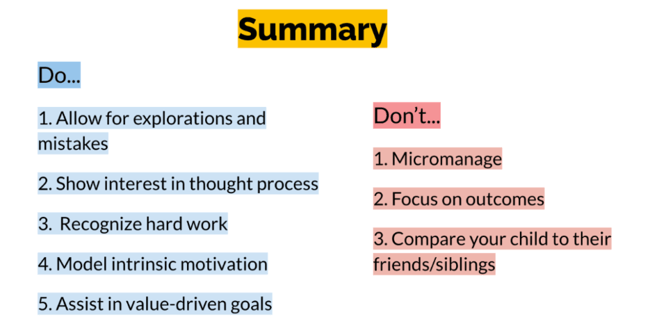At the May PSO meeting earlier this month, we heard from two seniors, Lillian Fu and Anita Feng. Their presentation was around types of motivation and the “do’s” and “don'ts” of motivating your student to succeed.

This is a common topic in parenting, no matter the age of the students. We, as counselors, thought it was excellent information to share with the community. Lillian and Anita have graciously shared their summary of suggestions below.
Tips on How to Motivate Your MS and HS Students:
Don’t...
Micromanage
It’s tempting! But it results in a tunnel vision, where your children’s motivation is to only please you instead of finding true appreciation for their tasks. It also leads to a lack of self-discipline and judgment when your children have to work and live independently.
Focus on Outcomes
Focusing on outcomes (frequently asking your child about their grades, unsolicited judgments about university choices, etc.) can give your child the false impression that you care less about their personal development and more about the numbers in their grade book or the name of the university they end up at.
Compare to Friends or Siblings
By comparing your children with their friends/siblings, you might be communicating that they can only be valued and loved if they out-perform other people. This fosters an overly competitive mindset, decreases their self-esteem, and might kill their motivation to explore their true passions.
Do...
Allow for Exploration and Mistakes
Encourage your child to explore different hobbies and take healthy risks, especially in their first years of high school. Passion is one of the most powerful intrinsic motivators, so be patient and encouraging as they find something (academic or not) that they are intrinsically motivated to pursue.
Show Interest in the Process
Ask questions like “what’s your favorite part about doing …?” By doing so, you are prompting your children to think more about the purpose and values behind their work/activities. You are showing that you truly care about their growth rather than just the outcome.
Recognize Hard Work
Take time to recognize your child’s efforts - both when they do and don’t succeed to demonstrate that you are proud of them and convey the message that their “failures” or shortcomings do not define them. The latter message exercises resilience and perseverance, both of which are practiced through intrinsic motivation.
Model Intrinsic Motivation
By the magic of observational learning, your attitude has a direct effect on your children. Start by talking about what excites you about your work/responsibilities, and you can even share the challenges you are facing and how you plan to overcome them. This helps to shape the way your children think about responsibilities and facing setbacks.
Value-Driven Goal Setting
Chances are, your child wants the 4.0 GPA, and 1600 SAT score as much as you do. Therefore, fixating on those “superficial” goals and applying more pressure on them could be counterproductive. Instead, setting “value-driven goals” (See: the image below) is a worthy investment because it will bring gravitas and sustainability to the other goals.







